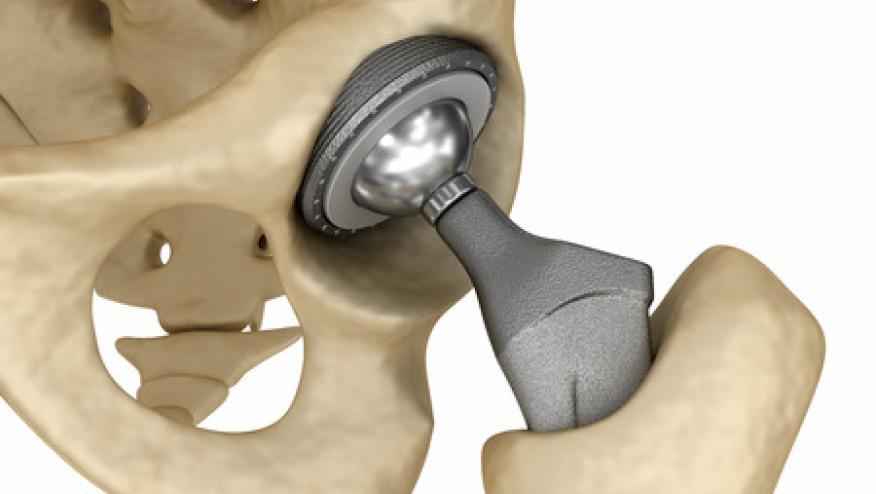Could Weight-Loss Drug Improve Hip Replacement Outcomes? Save

The antidiabetic and weight-loss drug semaglutide (Ozempic, Wegovy, Rybelsus) either does or does not help patients undergoing total hip arthroplasty (THA) avoid complications and other poor outcomes, according to two retrospective studies presented here.
In one of the studies, conducted by researchers at Maimonides Medical Center in Brooklyn, New York, rates of 90-day readmission and prosthetic joint infections were significantly lower among patients taking semaglutide versus matched controls. Strong trends toward lower rates of other adverse outcomes were also associated with the drug.
But in the other, conducted at Washington University in St. Louis -- which also analyzed medical records to compare outcomes in THA patients on semaglutide with matched controls -- no significant differences were found, with few hints that the drug might have helped.
Authors of both agreed on one thing, however: additional investigations of a potential link are warranted. Both studies were reported at the American Academy of Orthopaedic Surgeons' annual meeting.
Previous studies had shown that, for obese patients needing hip replacement, weight loss prior to undergoing the procedure leads to fewer complications and better device function. This has been particularly true with bariatric surgery. Now, with semaglutide and other glucagon-like peptide 1 agonists in wide use for type 2 diabetes and weight loss, it made sense to see whether THA patients on these agents have seen similar benefits.
The study finding in favor of semaglutide was led by Matthew Magruder, MD, of Maimonides. His group examined records from an unspecified administrative claims database spanning 2010 to 2021, which yielded 1,653 THA patients who were on semaglutide at the time of surgery. Each was matched to as many non-users as could be found who had similar clinical features, including sex, age, body mass index (BMI), comorbidity burden, diabetes and insulin status, and use of metformin; a total of 7,812 controls were thus assembled.
Magruder and colleagues examined 18 potential adverse outcomes, 11 of which were post-procedural complications such as 90-day incidence of thrombotic events and rehospitalization, while four were longer-term outcomes such as need for revision within 2 years. The group also looked at length of stay and costs for the initial procedure. Because of this large number of comparisons, P<0.01 was set as the threshold for statistical significance.
Nearly all of these at least trended in favor of semaglutide; the only exceptions being 2-year risk for periprosthetic fracture (OR 1.10, P=0.798) and 90-day pneumonia (OR 1.37, P=0.119). The two that did exceed the threshold for significance were 90-day readmission (OR 0.68, P=0.0004) and 2-year risk for prosthetic joint infection (OR 0.56, P=0.005). Others approaching statistical significance included lower rates for hypoglycemic events within 90 days (OR 0.45, P=0.035), 90-day acute kidney injury (OR 0.69, P=0.024), and 2-year revision (OR 0.64, P=0.026).
No difference was seen for length of stay. Mean costs the day of surgery and over the first 90 days were slightly lower in the semaglutide group.
In the second, negative study, Pooya Hosseinzadeh, MD, at Washington University, and colleagues took a somewhat different approach to their analysis of data from the national TriNetX system, which covers more than 50 healthcare systems serving some 90 million individuals. The investigators searched from 2003 to 2023 for THA patients with previous semaglutide prescriptions and BMI values greater than 30, ultimately identifying 616 individuals with 2 years of follow-up. Each was propensity-matched with a similar THA patient with no history of semaglutide.
As in the Maimonides study, Hosseinzadeh and colleagues examined a large number of adverse outcomes, both short- and long-term. In this case, however, none came close to showing a statistically significant difference between groups even at P<0.05. Moreover, although the researchers suggested their study was underpowered, there was not even a discernible pattern among the trends -- for both early and late complications, some were numerically more common in the semaglutide group while others were either nearly equal or less frequent with the drug.
Both studies included important limitations, most notably that doses and indications for prescribing semaglutide were not known for individual patients. Dosing recommendations differ for weight loss versus diabetes, with the higher doses generally used for the former; but approval for that indication only came in June 2021. Thus, results of both studies might not apply fully to patients on semaglutide expressly for weight loss.
Source Reference: Momtaz D, et al "The effect of semaglutide treatment on postoperative outcomes of total hip arthroplasty in patients with obesity: a matched study" AAOS 2024; Poster e003.









If you are a health practitioner, you may Login/Register to comment.
Due to the nature of these comment forums, only health practitioners are allowed to comment at this time.